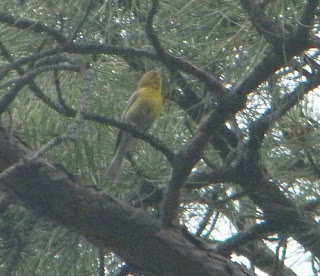 |
| snow from another year (Margo D. Beller) |
I could go on about this abnormal weather and global warming and such, but right now I am wondering about the birds.
When we had warmer than usual temperatures last week, I saw many reports of first migrants arriving - phoebes, pine warblers, redwinged blackbirds. (I have seen two out of three; no pine warblers.) There were lots of bugs and the flowers were opening. Forsythia, daffodils. The iris is starting to grow, the crocus and snowdrops are finished. Magnolias and cherry trees have started flowering. The garden stores have started selling fruit trees and pansies for the color deprived and early vegetables for those itching to start their plots.
I would hope these store plants have been covered because the cold must be a shock to the system.
 |
| pine warbler (Margo D. Beller) |
I don't know the answers. I do know the yardbirds have been visiting the feeders a lot, and they've been singing territorial songs. With the clock now set ahead an hour, it is just light when I rise. Outside I can hear singing song sparrows, titmice, cardinals and American and fish crows. But these are not the migrants.
We birders can only hope that when the warm weather returns, so will the migratory birds.

No comments:
Post a Comment